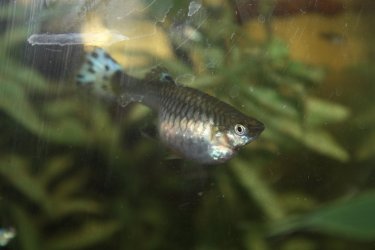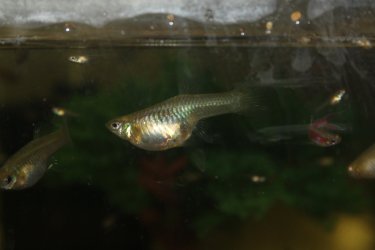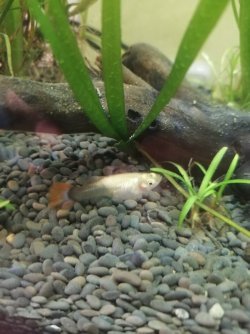You are using an out of date browser. It may not display this or other websites correctly.
You should upgrade or use an alternative browser.
You should upgrade or use an alternative browser.
Pregnant guppy or just ill?
- Thread starter Tiara
- Start date
By the way, I checked the tank 1 hour ago and the "pregnant" fish is flat, no fry to be found either. Probably her belly was full of waste, not pregnantPregnant guppies can even become much bigger than yours...
View attachment 351186View attachment 351187

You can also give it some time and see if there are some fry swimming around. For not always are fry that easily to spot.By the way, I checked the tank 1 hour ago and the "pregnant" fish is flat, no fry to be found either. Probably her belly was full of waste, not pregnant
And in their first moments they aren't free swimming either, from what I know. They need atmospheric air to gain the balance.You can also give it some time and see if there are some fry swimming around. For not always are fry that easily to spot.
Edited my m a j o r spelling mistake
After you have completed the salt treatment and eliminated it from the water, I recommend using a de-worming medication like flubendazole (Colin mentions NT Labs Anti fluke and worms). The first video possibly shows ‘stringy white pooh’ and odds are they have worms.
Heya, while I was filming it, I noticed the white thingy also. It seemed like a small root, not a white poop. But it's always better to be cautious.After you have completed the salt treatment and eliminated it from the water, I recommend using a de-worming medication like flubendazole (Colin mentions NT Labs Anti fluke and worms). The first video possibly shows ‘stringy white pooh’ and odds are they have worms.
I did the salt treatment, as you mentioned, but sadly, yesterday the little guy died. He was fine the day before, although was spending more time on the surface of the aquarium. Visibly he seemed OK, but I guess he was far from healthy.Looks like a male with an external protozoan or bacterial infection on its back in front of the dorsal fin. It also appears bent, not sure if that's the picture.
Post more pictures and add some salt.
-------------------
SALT
You can add rock salt (often sold as aquarium salt), swimming pool salt, or any non iodised salt (sodium chloride) to the aquarium at the dose rate of 1 heaped tablespoon per 20 litres (5 gallons) of water. If there is no improvement after 48 hours you can double that dose rate so there is 2 heaped tablespoons of salt per 20 litres.
If you only have livebearers (guppies, platies, swordtails, mollies), goldfish or rainbowfish in the tank you can double that dose rate, so you would add 2 heaped tablespoons per 20 litres and if there is no improvement after 48 hours, then increase it so there is a total of 4 heaped tablespoons of salt per 20 litres.
Keep the salt level like this for 2 weeks.
The salt will not affect the beneficial filter bacteria but the higher dose rate (4 heaped tablespoons per 20 litres) will affect some plants and some snails. The lower dose rate (1-2 heaped tablespoons per 20 litres) will not affect fish, plants, shrimp or snails.
After you use salt and the fish have recovered, you do a 10% water change each day for a week using only fresh water that has been dechlorinated. Then do a 20% water change each day for a week. Then you can do bigger water changes after that. This dilutes the salt out of the tank slowly so it doesn't harm the fish.
If you do water changes while using salt, you need to treat the new water with salt before adding it to the tank. This will keep the salt level stable in the tank and minimise stress on the fish.
When you first add salt, add the salt to a small bucket of tank water and dissolve the salt. Then slowly pour the salt water into the tank near the filter outlet. Add the salt over a couple of minutes.
The other guppies are doing fine so far.
If a fish dies I like to do the following to reduce the number of disease organisms in the water and the chance of other fish picking up the issue (assuming there's a contagious disease).
Wipe the inside of the glass down with a clean fish sponge. This removes the biofilm on the glass and the biofilm will contain lots of harmful bacteria, fungus, protozoans and various other microscopic life forms.
Do a 75% water change and gravel clean the substrate every day for a week. The water changes and gravel cleaning will reduce the number of disease organisms in the water and provide a cleaner environment for the fish to recover in. It also removes a lot of the gunk and this means any medication can work on treating the fish instead of being wasted killing the pathogens in the gunk.
Make sure any new water is free of chlorine/ chloramine before it is added to the tank.
Clean the filter if it hasn't been done in the last 2 weeks. However, if the filter is less than 6 weeks old, do not clean it. Wash the filter materials/ media in a bucket of tank water and re-use the media. Tip the bucket of dirty water on the garden/ lawn. Cleaning the filter means less gunk and cleaner water with fewer pathogens so any medication (if needed) will work more effectively on the fish.
Wipe the inside of the glass down with a clean fish sponge. This removes the biofilm on the glass and the biofilm will contain lots of harmful bacteria, fungus, protozoans and various other microscopic life forms.
Do a 75% water change and gravel clean the substrate every day for a week. The water changes and gravel cleaning will reduce the number of disease organisms in the water and provide a cleaner environment for the fish to recover in. It also removes a lot of the gunk and this means any medication can work on treating the fish instead of being wasted killing the pathogens in the gunk.
Make sure any new water is free of chlorine/ chloramine before it is added to the tank.
Clean the filter if it hasn't been done in the last 2 weeks. However, if the filter is less than 6 weeks old, do not clean it. Wash the filter materials/ media in a bucket of tank water and re-use the media. Tip the bucket of dirty water on the garden/ lawn. Cleaning the filter means less gunk and cleaner water with fewer pathogens so any medication (if needed) will work more effectively on the fish.
Thank you, as always! I did a 75% water change and syphoned the gravel. Will do this for a week. I noticed another guppy a bit inactive, near the bottom.If a fish dies I like to do the following to reduce the number of disease organisms in the water and the chance of other fish picking up the issue (assuming there's a contagious disease).
Wipe the inside of the glass down with a clean fish sponge. This removes the biofilm on the glass and the biofilm will contain lots of harmful bacteria, fungus, protozoans and various other microscopic life forms.
Do a 75% water change and gravel clean the substrate every day for a week. The water changes and gravel cleaning will reduce the number of disease organisms in the water and provide a cleaner environment for the fish to recover in. It also removes a lot of the gunk and this means any medication can work on treating the fish instead of being wasted killing the pathogens in the gunk.
Make sure any new water is free of chlorine/ chloramine before it is added to the tank.
Clean the filter if it hasn't been done in the last 2 weeks. However, if the filter is less than 6 weeks old, do not clean it. Wash the filter materials/ media in a bucket of tank water and re-use the media. Tip the bucket of dirty water on the garden/ lawn. Cleaning the filter means less gunk and cleaner water with fewer pathogens so any medication (if needed) will work more effectively on the fish.
I did a water test with Sera strips, and everything seems fine.
Could it be, because of the softer water? Maybe Guppies, despite being kept in the same city water in fish stores, need harder water? I have the feeling they don't feel as good, as when I brought them home.
Just to mention that my water is suitable for breeding Apistogramas.
I will add coral sand to raise up the hardness. I hope the Guppies will last for some time. After that I won't get any live bearer fish.
Post pictures of the fish that isn't looking right.
What is the GH (general hardness), KH (carbonate hardness) and pH of your water supply?
This information can usually be obtained from your water supply company's website (Water Analysis Report) or by telephoning them. If they can't help you, take a glass full of tap water to the local pet shop and get them to test it for you. Write the results down (in numbers) when they do the tests. And ask them what the results are in (eg: ppm, dGH, or something else).
Guppies like a GH around 200ppm but are normally fine with a GH between 150-300ppm. If it's less than 150ppm you can add a Rift Lake water conditioner at a lowered dose rate to increase the hardness. rift Lake water conditioner is used to increase the GH, KH and pH of the water for African rift Lake cichlids but works well for livebearers too, just use at a lower dose rate if your GH is below 150ppm.
What is the GH (general hardness), KH (carbonate hardness) and pH of your water supply?
This information can usually be obtained from your water supply company's website (Water Analysis Report) or by telephoning them. If they can't help you, take a glass full of tap water to the local pet shop and get them to test it for you. Write the results down (in numbers) when they do the tests. And ask them what the results are in (eg: ppm, dGH, or something else).
Guppies like a GH around 200ppm but are normally fine with a GH between 150-300ppm. If it's less than 150ppm you can add a Rift Lake water conditioner at a lowered dose rate to increase the hardness. rift Lake water conditioner is used to increase the GH, KH and pH of the water for African rift Lake cichlids but works well for livebearers too, just use at a lower dose rate if your GH is below 150ppm.
I home-tested the water and the parameters are as follow:Post pictures of the fish that isn't looking right.
What is the GH (general hardness), KH (carbonate hardness) and pH of your water supply?
This information can usually be obtained from your water supply company's website (Water Analysis Report) or by telephoning them. If they can't help you, take a glass full of tap water to the local pet shop and get them to test it for you. Write the results down (in numbers) when they do the tests. And ask them what the results are in (eg: ppm, dGH, or something else).
Guppies like a GH around 200ppm but are normally fine with a GH between 150-300ppm. If it's less than 150ppm you can add a Rift Lake water conditioner at a lowered dose rate to increase the hardness. rift Lake water conditioner is used to increase the GH, KH and pH of the water for African rift Lake cichlids but works well for livebearers too, just use at a lower dose rate if your GH is below 150ppm.
pH around 6.8
Gh around 6 dGH, which is around 107 ppm
KH around 6 dGH.
Way too soft, it seems.
I'll attach a picture of the fish.
Attachments
Is its body normally white like that?
if not then it's either a microsporidian infection or a bad bacterial infection.
Add salt to the tank (2 heaped tablespoons per 20 litres of water. Keep the salt in there for 2 weeks).
if not then it's either a microsporidian infection or a bad bacterial infection.
Add salt to the tank (2 heaped tablespoons per 20 litres of water. Keep the salt in there for 2 weeks).
Her body is bright yellow, it can't be seen in the picture, but she hasn't lost color.Is its body normally white like that?
if not then it's either a microsporidian infection or a bad bacterial infection.
Add salt to the tank (2 heaped tablespoons per 20 litres of water. Keep the salt in there for 2 weeks).
I think this is some kind of parasite, because now I noticed she has white stringy poop, but yesterday her poop was fine (she is eating a lot).
So salt will help? I also have some Sera medications, but need to check them out, because I havent used them lately.
P. S I just fed them and suddenly she got amazing energy and appetite, which is a good sign. Even now she is roaming the aquarium. But definitely I need to medicate.
Last edited:
Similar threads
- Replies
- 10
- Views
- 2K
- Replies
- 7
- Views
- 788
- Replies
- 3
- Views
- 2K
Most reactions
-
 394
394 -
 165
165 -
 154
154 -
 153
153 -
 152
152 -
 139
139 -
 132
132 -
 115
115 -
 101
101 -
 86
86 -
 66
66 -
 61
61 -
 57
57 -
 51
51 -
F
48




